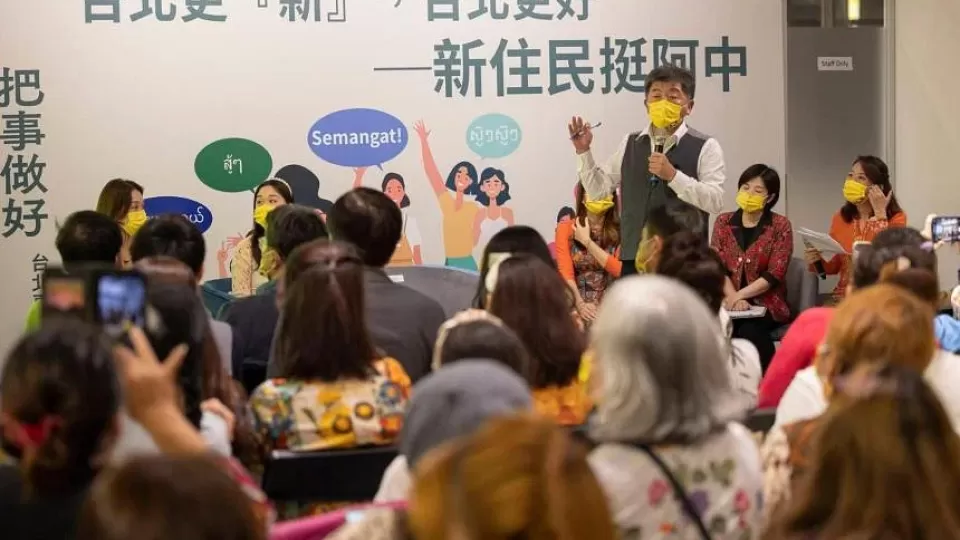November 24, 2022
TAIPEI – At first glance, election candidate Lu Chia-hsuan’s campaign poster looks just like the many others plastered all over buses, buildings and streets in Taiwan.
But there’s a line at the bottom which sets it apart. “Yanpu rural township chief candidate, please vote,” it reads – in Vietnamese.
It is, of course, a deliberate inclusion.
“The Vietnamese words on the poster were added by our new immigrant friends as a show of support,” Ms Lu told The Straits Times. “If new immigrants need anything, we will also work hard to serve them immediately.”
Candidates like Ms Lu – who is standing for re-election as the head of Pingtung county’s Yanpu rural township – are trying to court new immigrants. Often referred to locally as “new residents”, they became Taiwanese typically through marriage. This means that they are eligible to vote.
On Saturday, they will be among the more than 19 million eligible voters who are set to elect their city and county leaders, in a municipal election that is often seen as a midterm test for the ruling Democratic Progressive Party (DPP).
The Central Election Commission has dedicated an entire section of its website to them. It features infographics and videos with instructions on how to vote, in languages such as Vietnamese, Thai, Tagalog, Khmer and Bahasa Indonesia.
This is despite the fact that new immigrants make up only about 1.3 per cent of the total electorate in 2022.
“Statistically, they are not a huge number but they are a significant group, and their number has been in constant growth,” said Dr Lara Momesso, a senior lecturer at the University of Central Lancashire who has done extensive research on the political participation of migrants in Taiwan.
“It’s also important to think in terms of network – targeting this group most probably also means attracting other members of their family, especially their children.”
It’s also about the island portraying a positive image, said Dr Momesso.
“By displaying its openness and willingness to allow migrants to be part of the voting process, the Taiwanese government could foster an image of Taiwan as a hub for regional migration… reinforcing the idea that Taiwan is multicultural and democratic.”
According to the Ministry of the Interior, there are around 570,000 new immigrants in Taiwan, which account for roughly 2.4 per cent of the island’s population. The majority hail from China, which includes Hong Kong and Macau, followed by Vietnam and Indonesia.

Ms Lu Chia-hsuan is standing for re-election as the head of Pingtung county’s Yanpu rural township. PHOTO: LU CHIA-HSUAN/FACEBOOK
Mrs Chini Huang is a Filipina who married a Taiwanese engineer. The 40-year-old, who runs an online platform which connects Filipinos living in Taiwan, told ST that she is heartened to see more politicians paying attention to new immigrants during this election season.
“But I really hope that they implement real policies to deal with some of our concerns, and not just use us for show at events to appear like they are very welcoming of this community,” she said, noting that she is not aligned with either the DPP or the main opposition party, the Kuomintang (KMT).
“Many new immigrants face problems like discrimination in society, unemployment, Chinese language difficulties and domestic abuse – these are all real issues that need to be addressed.”
Taiwanese politicians are certainly promoting themselves as heeding the community’s concerns.
DPP legislator Loh Meei-ling, who was born a Malaysian, is leading her party’s campaign messaging efforts towards new immigrants.
“New residents and their children generally have the advantages of dual cultures, languages and connections,” she said, adding that they contribute to Taiwan’s development and diversity.
In October, she hosted an event where the DPP’s Taipei mayoral candidate Chen Shih-chung pledged to set up offices in each of the capital city’s 12 administrative districts dedicated to new immigrant affairs.

DPP legislator Loh Mei-ling (in orange kebaya) with new immigrants from Vietnam at an event. PHOTO: COURTESY OF LOH MEI-LING
Meanwhile, the KMT’s Taoyuan mayoral candidate Simon Chang has promised to provide better resources for new immigrants if he is elected, such as legal consulting and translation services across the city’s district offices.
There are more than 63,700 new immigrants in Taoyuan, which is about 11 per cent of Taiwan’s total new immigrant population. Out of those families, there are around 19,000 children attending middle and elementary schools in the city, Dr Chang said. “Addressing the concerns of new residents is not just about the individuals themselves – it’s also about improving entire Taiwanese families and taking care of Taiwan’s future generations,” he told ST.


